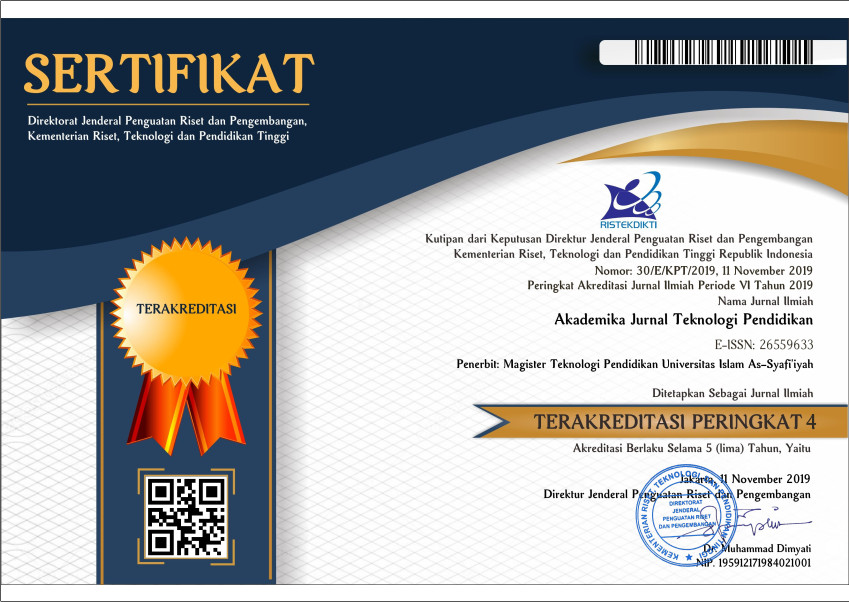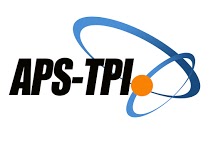IMPLEMENTATION OF E-MODULE TROUBLESHOOTING NETWORK SERVICES BASED MOBILE AS ALTERNATIVE MEDIA
Abstract
The purpose of this study was to: (1) knowing the level of practicality e-module based on mobile learning; (2) determine the effectivenes of using system e-module based on mobile learning in skill competency test TKJ. The research method experimental design one group pre-test and post-test. Data were collected through multiple choice test given to respondens before being given treatment and after being given treatment, then the data would then be analyzed using tes t. The results of the e-module practicality test throught a questionnaire distributed to students showed that the e-module based on mobile learning practicality used by students, while according to the assessment by the two media experts that e-module based on mobile learning was practical with an average score of 88.9%. Student readiness in UKK has been successfully improved using mobile learning-based e-modules. Increased readiness of students in UKK is in the medium category with a gain score of 0.4%. The T test results indicate that the Sig. (2-tailed) of 0.000 <0.05. The mean pre-test value was 78.6456 with Std.Deviation 4.85293. The highest value is 90.00 and the lowest value is Std.Deviation 6.57910. The highest score was 96.67 and the lowest score was 73.33.
References
Fausih, M., & Danang, T. (2015). Pengembangan Media E-Modul Mata Pelajaran Produktif Pokok Bahasan “ Instalasi Jaringan Lan ( Local Area Network )” Untuk Siswa Kelas Xi Jurusan Teknik Komputer Jaringan Di SMK Nengeri 1 Labang. Bioedukasi, 9(20), 1–9.
Hake, R. R. (2009). Towards Paradigm Peace In Physics Education Research *†, (1989), 1–18.
Herrera, S., Fennema, M., & Morales, M. (2015). Mobile technologies in engineering education. Learning (ICL), 2015 …, September.
Khasanah, & Heryanti, N. (2017). Pengaruh Pemanfaatan Bahan Ajar Audio Visual Dan Kreativitas Belajar Terhadap Hasil Belajar Ilmu Pengetahuan Alam. Akademika, 6(02), 1–16. https://doi.org/10.34005/akademika.v6i02.139
Kristiyani, E., & Budiningsih, I. (2019). Pengaruh Strategi Pembelajaran E-Learning Dan Minat Belajar Terhadap Hasil Belajar Akuntansi. Akademika, 8(01), 81–100. https://doi.org/10.34005/akademika.v8i01.341
Sunarya, I. M. G., & Putrama, I. M. (2016). Pengembangan E-Modul Berbasis Project Based Learning Pada Mata Pelajaran Simulasi Digital Untuk Siswa Kelas X Studi Kasus Di Smk Negeri 2 Singaraja. 13(2), 184–197.
Suyoso, & Nurohman, S. (2014). Developing web-based electronics modules as physics learning media. Jurnal Kependidikan, 44(1), 73–82.
Sugiyono. (2015). Metode Penelitian & Pengembangan Research and development. (S. Y. Suryandari, Ed.). Bandung: Alfabeta, Cv.
PSMK, D. (2019). Panduan Pelaksanaan Uji Kompetensi Keahlian Tahun ajaran 2019/2020. Jakarta: Direktorat Pembinaan Sekolah Menengah kejuruan.
This work is licensed under a Creative Commons Attribution 4.0 International License.
Authors who publish with this journal agree to the following terms:
- Authors retain copyright and grant the journal right of first publication with the work simultaneously licensed under a Creative Commons Attribution License that allows others to share the work with an acknowledgement of the work's authorship and initial publication in this journal.
- Authors are able to enter into separate, additional contractual arrangements for the non-exclusive distribution of the journal's published version of the work (e.g., post it to an institutional repository or publish it in a book), with an acknowledgement of its initial publication in this journal.
- Authors are permitted and encouraged to post their work online (e.g., in institutional repositories or on their website) prior to and during the submission process, as it can lead to productive exchanges, as well as earlier and greater citation of published work (See The Effect of Open Access).









